Related Research Articles

Dennis Christopher George Potter was an English television dramatist, screenwriter and journalist. He is best known for his BBC television serials Pennies from Heaven (1978) and The Singing Detective (1986) as well as the BBC television plays Blue Remembered Hills (1979) and Brimstone and Treacle (1976). His television dramas mixed fantasy and reality, the personal and the social, and often used themes and images from popular culture. Potter is widely regarded as one of the most influential and innovative dramatists to have worked in British television.

Edward Charles Morice Fox is an English actor and a member of the Fox family.
Cold Lazarus is a four-part British television drama written by Dennis Potter with the knowledge that he was dying of pancreatic cancer. It forms the second half of a pair with the television serial Karaoke.

The Wednesday Play is an anthology series of British television plays which ran on BBC1 for six seasons from October 1964 to May 1970. The plays were usually original works written for television, although dramatic adaptations of fiction also featured. The series gained a reputation for presenting contemporary social dramas, and for bringing issues to the attention of a mass audience that would not otherwise have been discussed on screen.
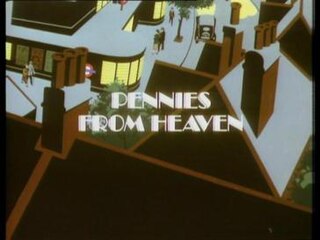
Pennies from Heaven is a 1978 BBC musical drama serial written by Dennis Potter. The title is taken from the song "Pennies from Heaven" written by Johnny Burke and Arthur Johnston. It was one of several Potter serials to mix the reality of the drama with a dark fantasy content, and the earliest of his works where the characters burst into extended performances of popular songs.
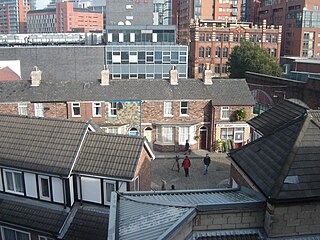
Weatherfield is a fictional town based on Salford, Greater Manchester, which has been the setting for the British ITV soap opera Coronation Street since its inception in 1960. Much of Weatherfield has been seen by viewers throughout the years, though the primary focus from the viewer's perspective is the eponymous Coronation Street, a cobbled street where many of the programme's characters live. The soap opera is often shot on location around Salford and the neighbouring large city of Manchester, as its filming studios, the Granada Studios complex on Quay Street in Manchester city centre and its replacement set MediaCityUK in Salford Quays, only house the outdoor sets of Coronation Street and its immediate surrounding streets.
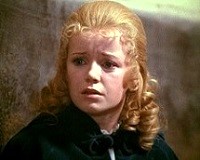
Angharad Mary Rees, The Hon. Mrs David McAlpine, CBE was a British actress, best known for her British television roles during the 1970s and in particular her leading role as Demelza in the 1970s BBC TV costume drama Poldark.
"Son of Man" is a British television play by playwright Dennis Potter which was first broadcast on BBC1 on 16 April 1969, in The Wednesday Play slot. An alternative depiction of the last days of Jesus, Son of Man was directed by Gareth Davies and starred Northern Irish actor Colin Blakely. The play was shot on videotape over three days on a very limited budget: Potter was later to say that the set "looks as though it's trembling and about to fall down."
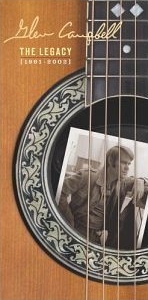
The Legacy (1961–2002) is a boxset covering four decades of recordings by Glen Campbell. The fourth CD is a compilation of live recordings.
Where Adam Stood is a television play by Dennis Potter, first broadcast on BBC 2 in 1976. It is a free adaptation, wholly shot on film, of Edmund Gosse's autobiographical book Father and Son (1907).
Follow the Yellow Brick Road is a television play by Dennis Potter, first broadcast in 1972 as part of BBC Two's The Sextet series of eight plays featuring the same six actors. The play's central theme is of popular culture becoming the inheritor of religious scripture, which anticipated Potter's later serial Pennies from Heaven. The play's title is taken from the song used in The Wizard of Oz, another version of which features in the incidental music.

Blade on the Feather is a television drama by Dennis Potter, broadcast by ITV on 19 October 1980 as the first in a loosely connected trilogy of plays exploring language and betrayal. A pastiche of the John Le Carré spy thriller and transmitted eleven months after Anthony Blunt was exposed as the 'fourth man', the drama combines two of Potter's major themes: the visitation motif and political disillusionment. The play's title is taken from "The Eton Boating Song".

Gula Matari is a 1970 studio album by Quincy Jones.
Kenith Trodd is a British television producer best known for his professional association with television playwright Dennis Potter.
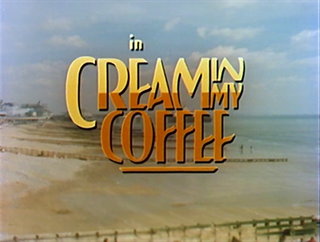
Cream in My Coffee is a television drama by Dennis Potter, broadcast on ITV on 2 November 1980 as the last in a loosely connected trilogy of plays exploring language and betrayal. A juxtaposition between youth and old age, the play combines a non-linear narrative with the use of popular music to heighten dramatic tension, a feature of much of Potter's work. Cream in My Coffee was awarded the Prix Italia for best drama in 1981 and Peggy Ashcroft gained a BAFTA Best Actress award in 1981. The play's title is taken from the popular song "You're the Cream in My Coffee", from the 1929 Broadway musical Hold Everything!
"Shaggy Dog", broadcast by ITV on 10 November 1968, is a black-and-white television play by Dennis Potter written for the London Weekend Television anthology series The Company of Five, specifically a group of five actors. The Company of Five ran for one series of six episodes.
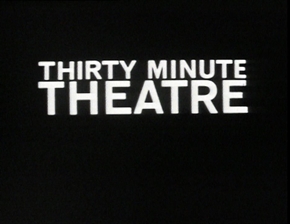
Thirty-Minute Theatre was a British anthology drama series of short plays shown on BBC Television between 1965 and 1973, which was used in part at least as a training ground for new writers, on account of its short running length, and which therefore attracted many writers who later became well known. It was produced initially by Harry Moore, later by Graeme MacDonald, George Spenton-Foster, Innes Lloyd and others. Thirty-Minute Theatre began on BBC2 in 1965 with an adaptation of the black comedy Parson's Pleasure. Dennis Potter contributed Emergency – Ward 9 (1966), which he partially recycled in the much later The Singing Detective (1986). In 1967 BBC2 launched the UK's first colour service, with the consequence that Thirty-Minute Theatre became the first drama series in the country to be shown in colour.
Masquerade is a 1929 American drama film directed by Russell Birdwell and written by Malcolm Stuart Boylan and Frederick Hazlitt Brennan. It is based on the 1907 novel The Brass Bowl by Louis Joseph Vance. The film stars Alan Birmingham, Leila Hyams, Arnold Lucy, Clyde Cook, J. Farrell MacDonald and George C. Pearce. The film was released on July 14, 1929, by Fox Film Corporation.
References
- ↑ W. Stephen Gilbert (1998) [1995]. The Life and Works of Dennis Potter. Woodstock, NY: Overlook Press. p. 341.
- ↑ Humphrey Carpenter (1999) [1998]. Dennis Potter: A Biography. London: Faber. pp. 300–1.
- ↑ John R. Cook (1998). Dennis Potter: A Life on Screen. Manchester: Manchester University Press. p. 84.
- 1 2 Gilbert, p. 213, 213n.